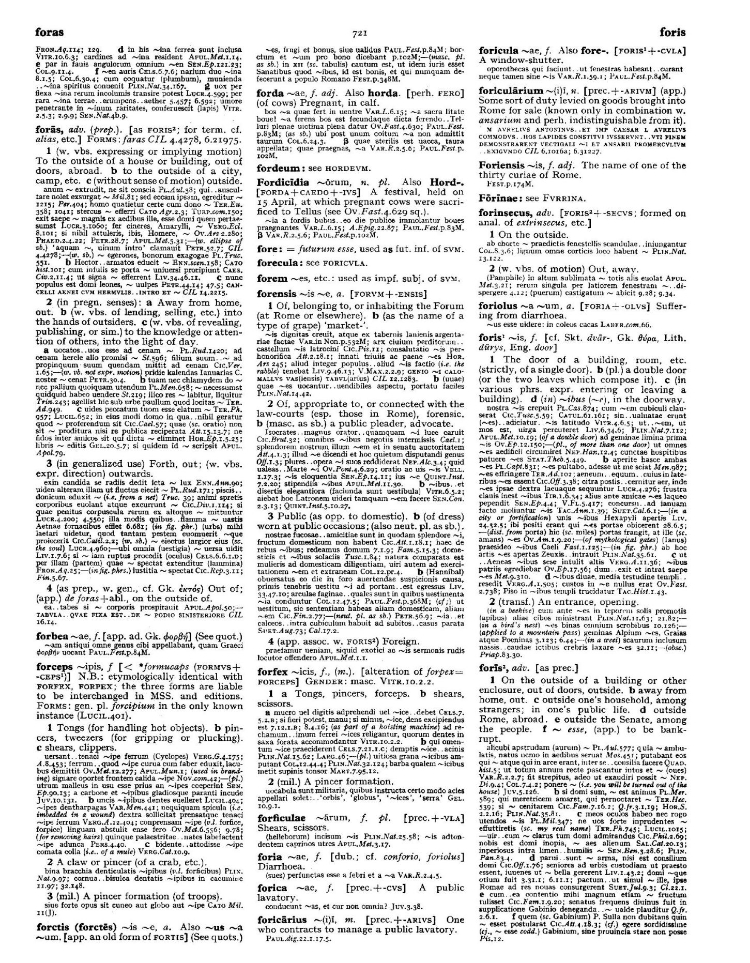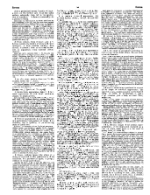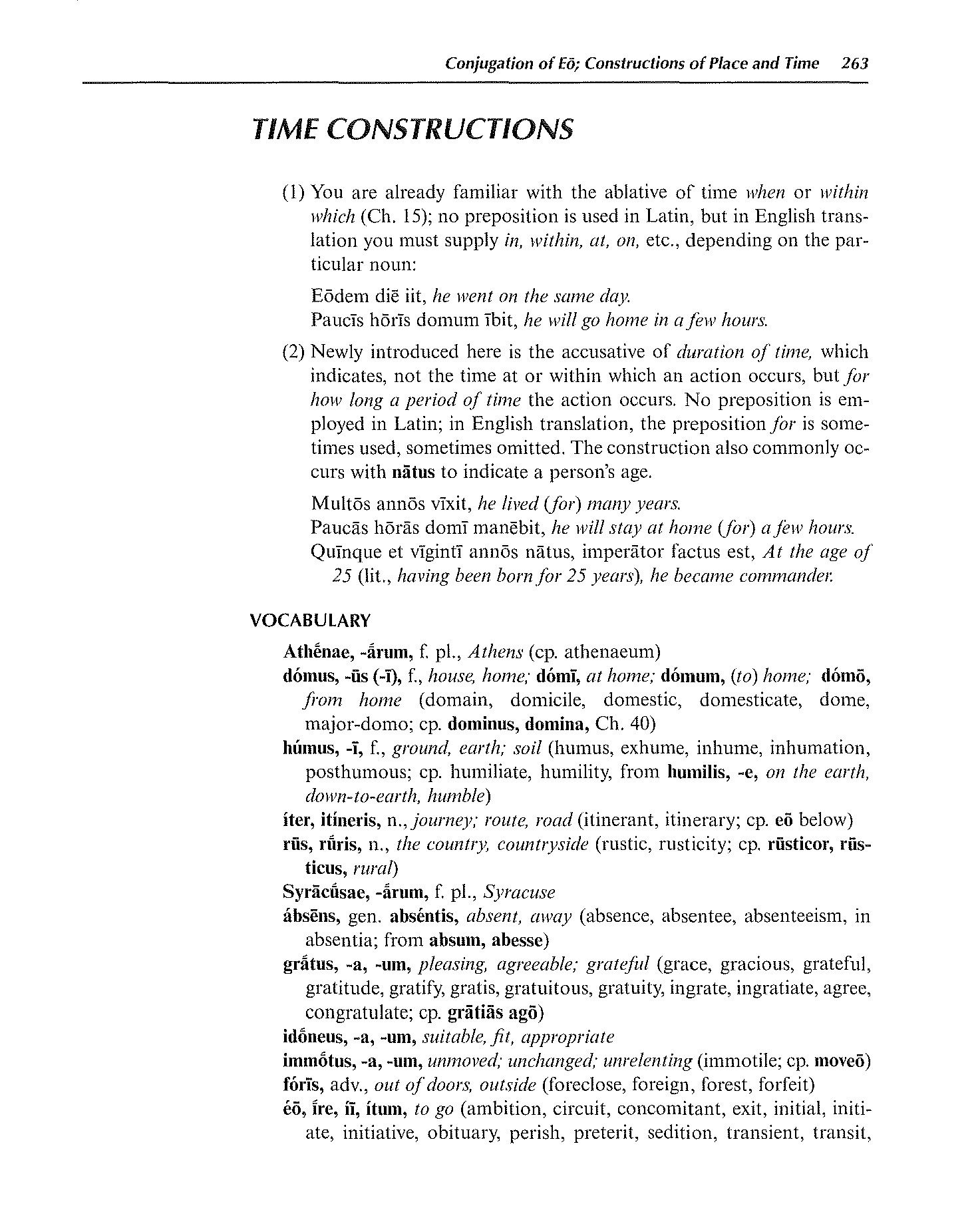
page_listing.tpl
page_subListingDetails.tpl
sub_listingDetails_style1.tpl
sub_listingDetails.title.tpl
forīs outside
forīs is a Latin Adverb that primarily means outside.
Definitions for forīs
Wheelock's Latin
Adverb
- 1
out of doors, outside
English derivatives:
foreclose foreign forest forfeit
Oxford Latin Dictionary
Adverb
- 1
On the outside of a building or other enclosure, out of doors, outside. (b) away from home, out. (c) outside one's household, among strangers; in one's public life. (d) outside Rome,abroad. (e) outside the Senate, among the people. (f) ~ esse, (appl) to be bankrupt.
- 2
(in a generalized sense) Outside, without; a foris, on the further side, (b) on the outer surface, externally; (esp. ref. to the application of remedies). (c) (transf.) external(ly) to a person or thing.
Sentences with forīs
Latin to English
Haec studia adolescentiam acuunt, senectutem oblectant, secundas res ornant, adversis perfugium ac solacium praebent, delectant domi, non impediunt foris, pernoctant nobiscum, peregrinantur, rusticantur.Compare These studies stimulate the young, divert the old, are an ornament in prosperity, and a refuge and comfort in adversity; they delight as at home, are no impediment in public life, keep us company at night, in our travels, and whenever we retire to the country.
Cenes, Canthare, cum foris libenter, clamas et maledicis et minaris.Compare Although you gladly dine abroad, Cantharus, you bawl and abuse and threaten people.
Nullus magnus civitas quiesco possum: si foris hostis non habeo, domus invenio.Compare No great state can be quiet: if it has not an enemy abroad, it finds one at home.
Declension table for forīs
Cactus2000
| Singular | Plural | |
| Nom. | forīs | forēs |
| Gen. | foris | forum |
| Dat. | forī | foribus |
| Acc. | forem | forēs |
| Abl. | fore | foribus |
Data sources
Notes
- Definitions
- Frederick M. Wheelock, Wheelock's Latin, 6th ed., rev. Richard A. LaFleur (New York, NY: HarperCollins Publishers, 2005): 263.
- P. G. W. Glare, Oxford Latin Dictionary, Vols. 1-8 (Oxford: Clarendon Press, 1982): 721.
- Word frequencies
- Paul B. Diederich, The Frequency of Latin Words and Their Endings, PhD diss., (Columbia University, 1939).
Bibliography
Allen, Joseph H. Allen and Greenough's New Latin Grammar for Schools and Colleges: Founded on Comparative Grammar. Edited by James B. Greenough, George L. Kittredge, Albert A. Howard, and Benjamin L. D'Ooge. Boston, MA: Ginn & Company, 1903.
Crystal, David. A Dictionary of Linguistics and Phonetics. 6th ed. Oxford, UK: Blackwell Publishing, 2008.
Delatte, Louis, Suzanne Govaerts, Joseph Denooz, and Etienne Evrard. Dictionnaire fréquentiel et index inverse de la langue latine [Frequency Dictionary and Inverse Index of the Latin Language]. Liège, Belgium: Laboratoire d'analyse statistique des langues anciennes de l'Université de Liège (L.A.S.L.A.), 1981.
Diederich, Paul B. The Frequency of Latin Words and Their Endings. PhD diss., Columbia University, 1939.
Francese, Christopher. "Latin Core Vocabulary." Dickinson College Commentaries. Last modified 2014. http://dcc.dickinson.edu/latin-vocabulary-list.
Gildersleeve, Basil L., and Gonzales Lodge. Gildersleeve's Latin Grammar: Third Edition, Revised, and Enlarged. 3rd ed. London, England: Macmillan and Co., 1903.
Glare, Peter G.W. Oxford Latin Dictionary. Vols. 1-8. Oxford, England: Clarendon Press, 1982.
Krüger, Bernd. "Latin Conjugation Tables." Cactus2000. Accessed May 5, 2023. https://latin.cactus2000.de/index.en.php.
Pierson, Nick. "Sound of Text." Accessed October 26, 2019. https://soundoftext.com.
Wheelock, Frederick M. Wheelock's Latin. 6th ed. Revised by Richard A. LaFleur. New York, NY: HarperCollins Publishers, 2005.
Wiktionary Contributors. "Victionarium." Wikimedia Foundation, Inc. Updated March 18, 2019. https://la.wiktionary.org/wiki/Victionarium:Pagina_prima.
Citation
Chicago (17th ed.)
Allo Contributors. "forīs (adv.) - Latin Word Definition." Allo Latin Dictionary. Last modified . Accessed February 20, 2026. http://ancientlanguages.org/latin/dictionary/foris.
Entry created on . Last updated on .








